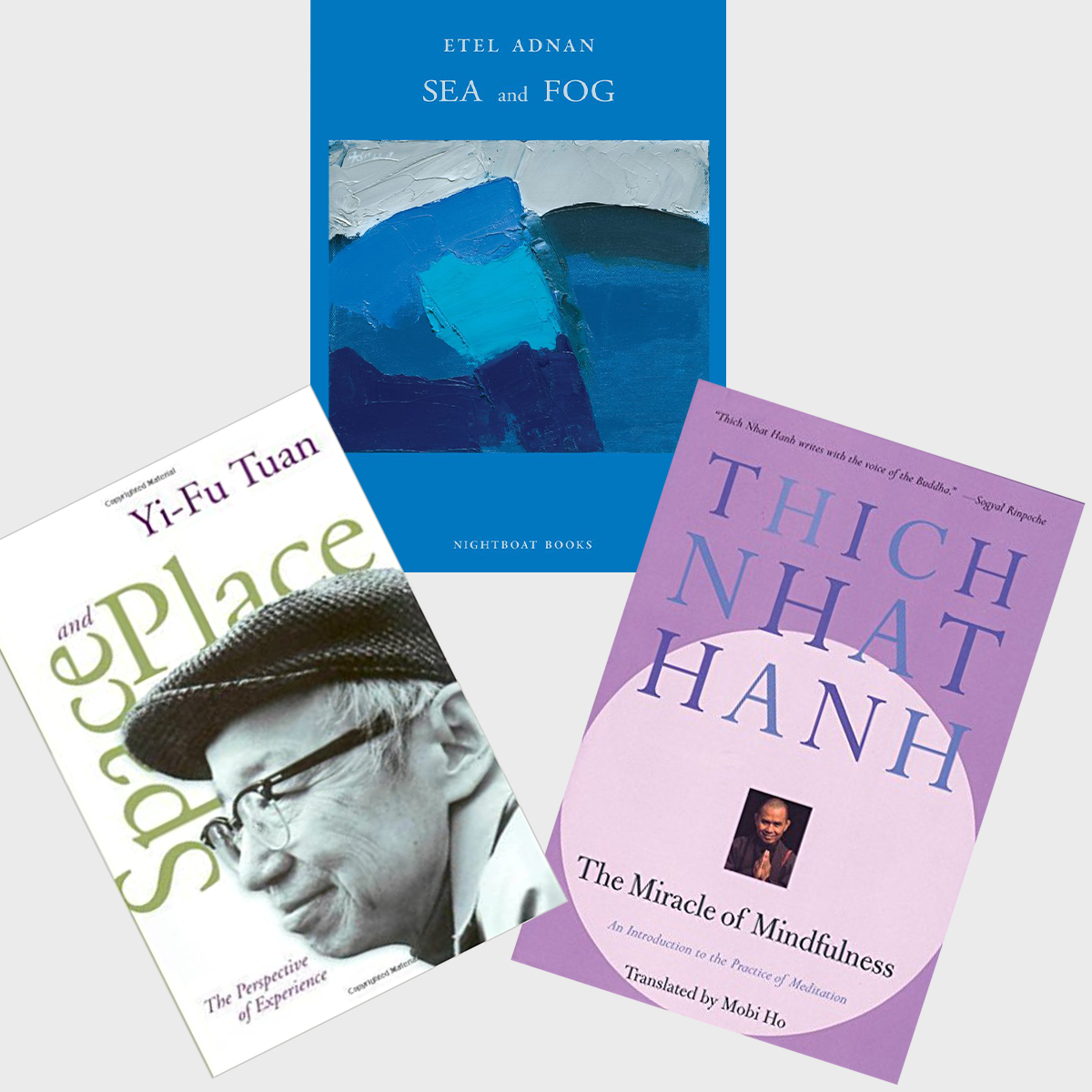Book Club
Micah Schippa b. 1988 — ideally here would be a list of rivers.
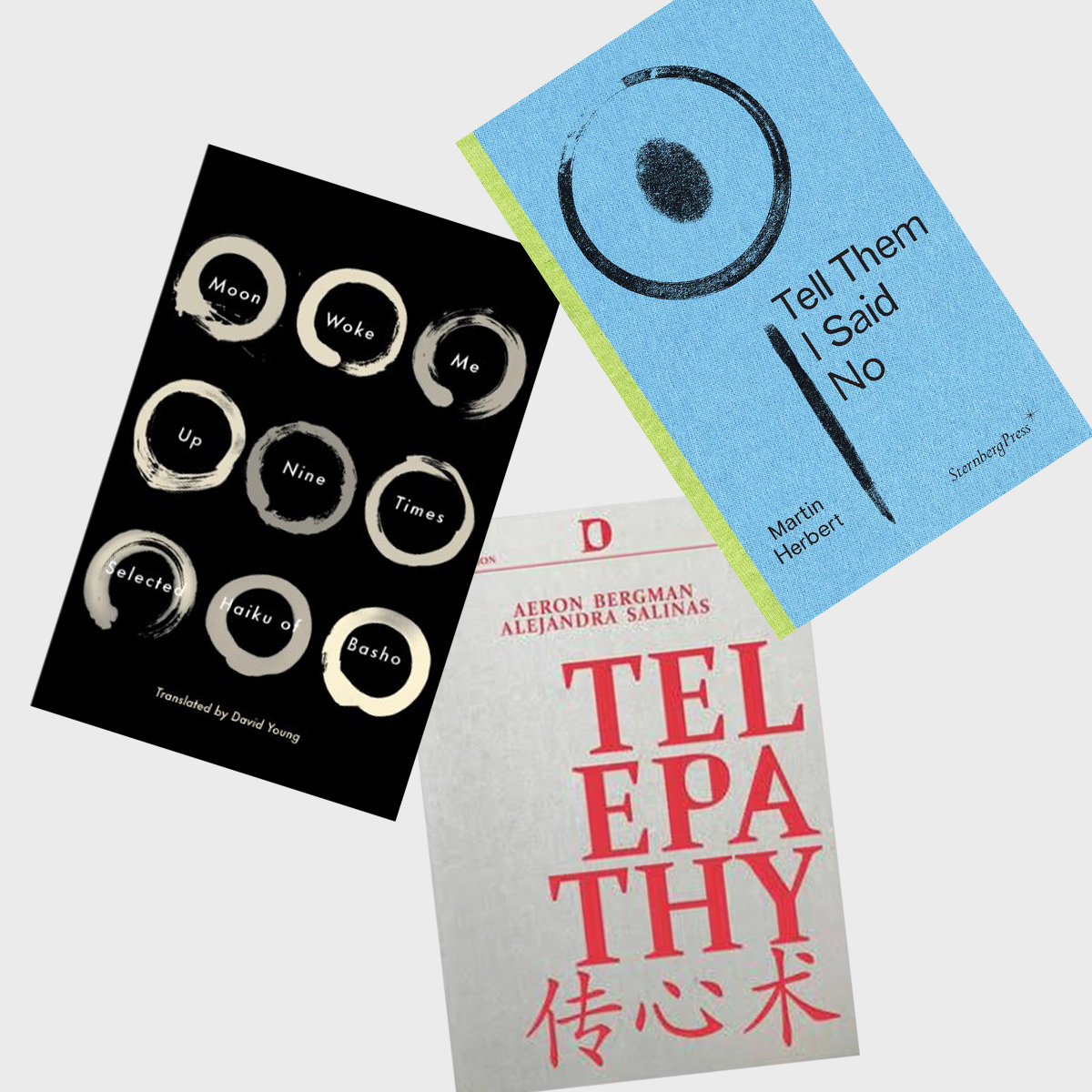
1. Telepathy 传心术 by Aeron Bergman and Alejandra Salinas
Telepathy illuminates the cynical, psychic control the market has over artists and creativity. While un-scientific and a bit rambling (a joy!), Telepathy provides a rubric for decolonizing creativity.
2. Moon Woke Me Up Nine Times: Selected Haiku of Basho by Matsuo Bashō
Moon Woke Me Up Nine Times is like being wine drunk with some ancient dryad. Berserk in its letting forth of song.
3. Tell Them I Said No by Martin Herbet
Tell Them I Said No by Martin Herbet is a cool, even keeled look at several canonical artists that ‘dropped out’ of the art world due to deep, frustrated agonizing over “arts” inability to solve problems, free the mind, or create any lasting “meaning” beyond the claustrophobic prison of the market. Ripe and dripping with contradictions it’s still a worth while endeavor.
Zehra Ahmed works at the intersection of art, design, food and culture. Raised in Karachi, Pakistan, food was a central theme in her life. Food was comfort, joy, family and friends.
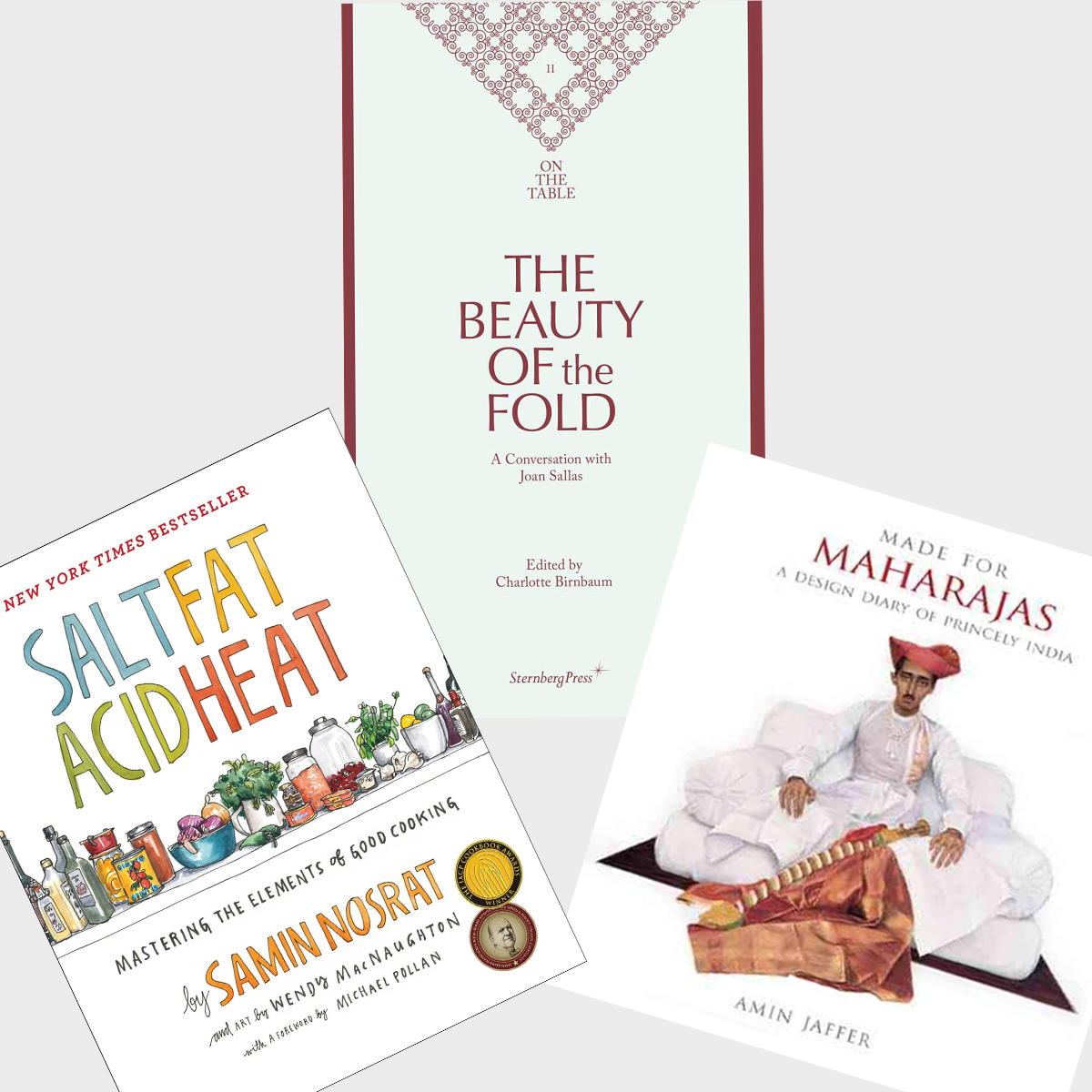
- Made for Maharajas: A Design Diary of Princely India by Amin Jaffer
2. Salt Fat Acid Heat by Samin Nosrat
I’m always reading this book. It’s fantastic for understanding concepts and techniques in cooking. It gives you the tools to create with whatever you have. Samin Nosrat goes into depth about something as simple as understanding the different types of salts and how they work. It’s fascinating and liberating. Nosrat describes flavor as something that lies at the intersection of taste, aroma and sensory elements including texture, sound, appearance, and temperature. That’s a lot of things to get right :)
3. The Beauty of the Fold: A conversation with Joan Sallas edited by Charlotte Birnbaum
I just ordered this book as I was researching the art of napkin folding. It’s super short but enlightening. Joan Sallas is an artist who has dedicated his life to folding, which is kind of amazing. I wish I had that level of dedication to such a specific art/craft. In reading this conversation I was reminded of how important it is to have desire, because that desire gives us the ability to create. A quote from the conversation is “If God exists ... he certainly collected an unbelievably large mass of desire from which all of creation was made.” This quote delights me and scares me, because our current times also remind me of the very misuse of this desire. The desire for man to play God. But really, this book is about folding so not quite as serious as I have made it sound.
Diamond Stingily is a poet and artist from Chicago, IL based in Brooklyn,NY.
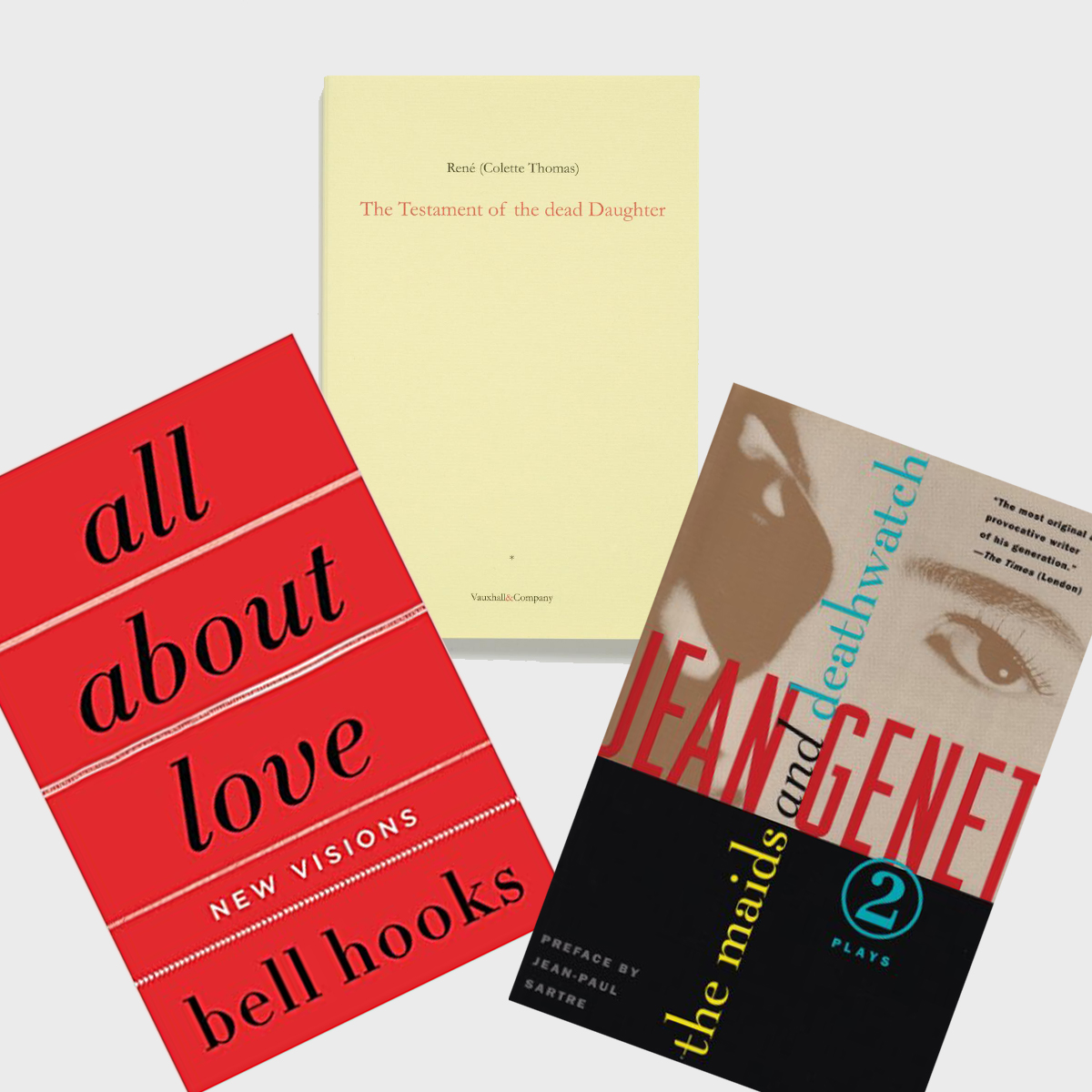
1. All About Love: New Visions by bell hooks
My friend, Joan, used to recommend bell hooks to me all the time. After years of not reading bell hooks, I went into a bookstore, saw it on the Staff’s Pick Wall and bought it. hooks writing reads like boxing, she is light on her feet with footwork then one of her sentences knocks me out. I have to put the book down and process what she wrote. hooks isn’t and doesn’t want to argue with the reader, it is well researched and organized to avoid that, love is a noun and is rarely seen as a verb that should be activated within any relationship not only romantic.
2. The Maids by Jean Genet
I like to read scripts. Genet is a madman. As a reader I cannot help but want to be engulfed in his world and be mischievous in it. The Maids is a violent tale of two sisters who do sadomasochistic rituals when their Mistress is away.
3. The Testament of The Dead Daughter by René (Colette Thomas)
René was the pseudonym of Colette Thomas, one of Antonin Artaud’s “daughters of the heart” who published this book in 1954 composed of letters to Artaud, neglect and suffering from early childhood and her time incarcerated. It reads like what a withering flower looks like on a rainy day.
Hiba Ali is a digital artist, educator, scholar, and DJ based across Chicago, IL, Austin, TX, and Toronto, ON and her work addresses womxn of color, surveillance and labor.
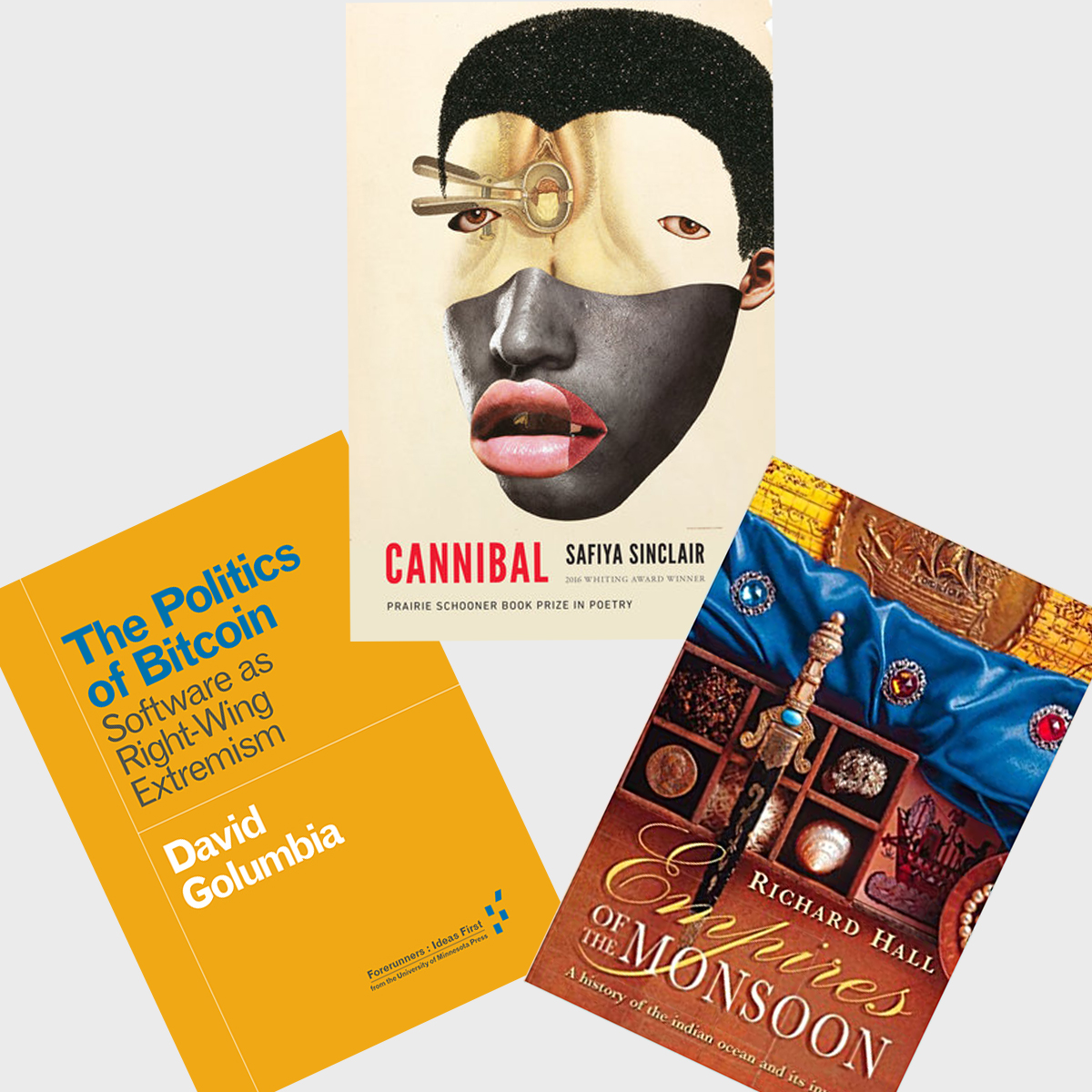
1. The Politics of Bitcoin: Software as Right Wing Extremism by David Golumbia A thoughtful and fascinating book that connects the operation of bitcoin as a currency with right wing libertarianism ideology so rife in the tech. industry and proves the idea that no government regulation in the name of “freedom” is actually rife for a free market consolidation around the wealthy.
2. Empires of the Monsoon: History of the Indian Ocean and Its Invaders by Richard Seymour Hall
A historically rich book that examines the history of trade, that includes enslaved people, spices, and gold, over the Indian Ocean between the Middle East, East Asia, East Africa and South Asia — a bit of family history research for me on my Black and brown ancestors.
3. Cannibal by Safiya Sinclair
An introspective poetry book that speaks of her childhood in Jamaica and her experiences in the U.S. I appreciate how she taken on the term cannibal, one used to denote indigenous Carib people and “savage-ness” and she takes it on to show the term’s colonial history and over the course of the book, illustrate how the term is layered throughout society.
Emily Lucid is an L.A. based multidisciplinary artist, a Jewish trans* woman, a writer, musician, model, actress, curator and writer.
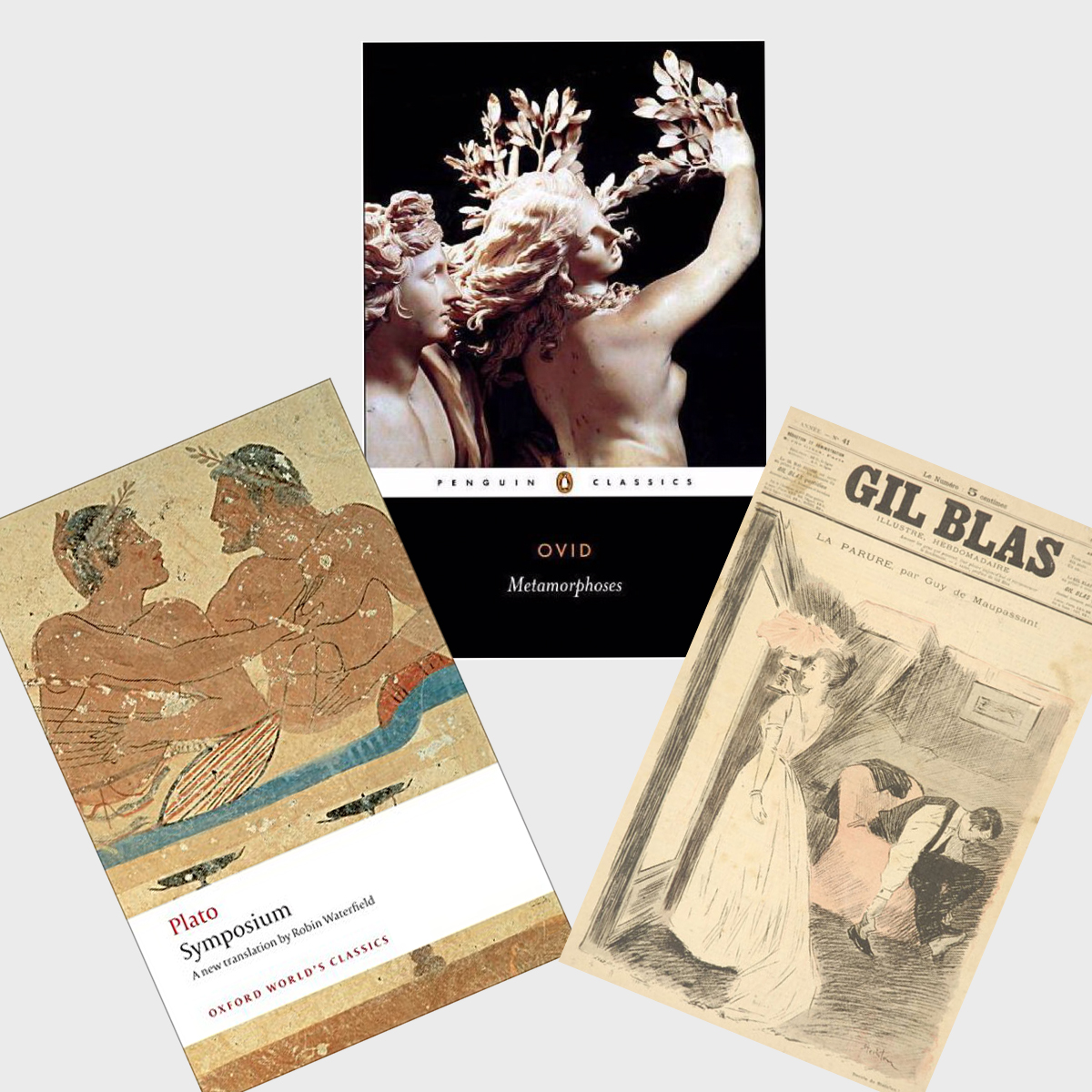
- The Metamorphosis by Ovid
2. The Symposium by Plato
The Symposium by Plato is a discourse, there is no narration it again exists as a document, this time of discussions between ancient Greek philosophers where they discuss nearly everything but particularly (and most interestingly to me) the notion of queerness as a natural phenomenon.
3. The Necklace by Guy de Maupassant
Maupassant's The Necklace is a short story with a tragically beautiful and ironic punchline at the end but the narrative is highly symbolic of the longing for a life of exquisite freedom most women will sadly never experience.
Emily Barker is an artist and activist based in Los Angeles, CA.
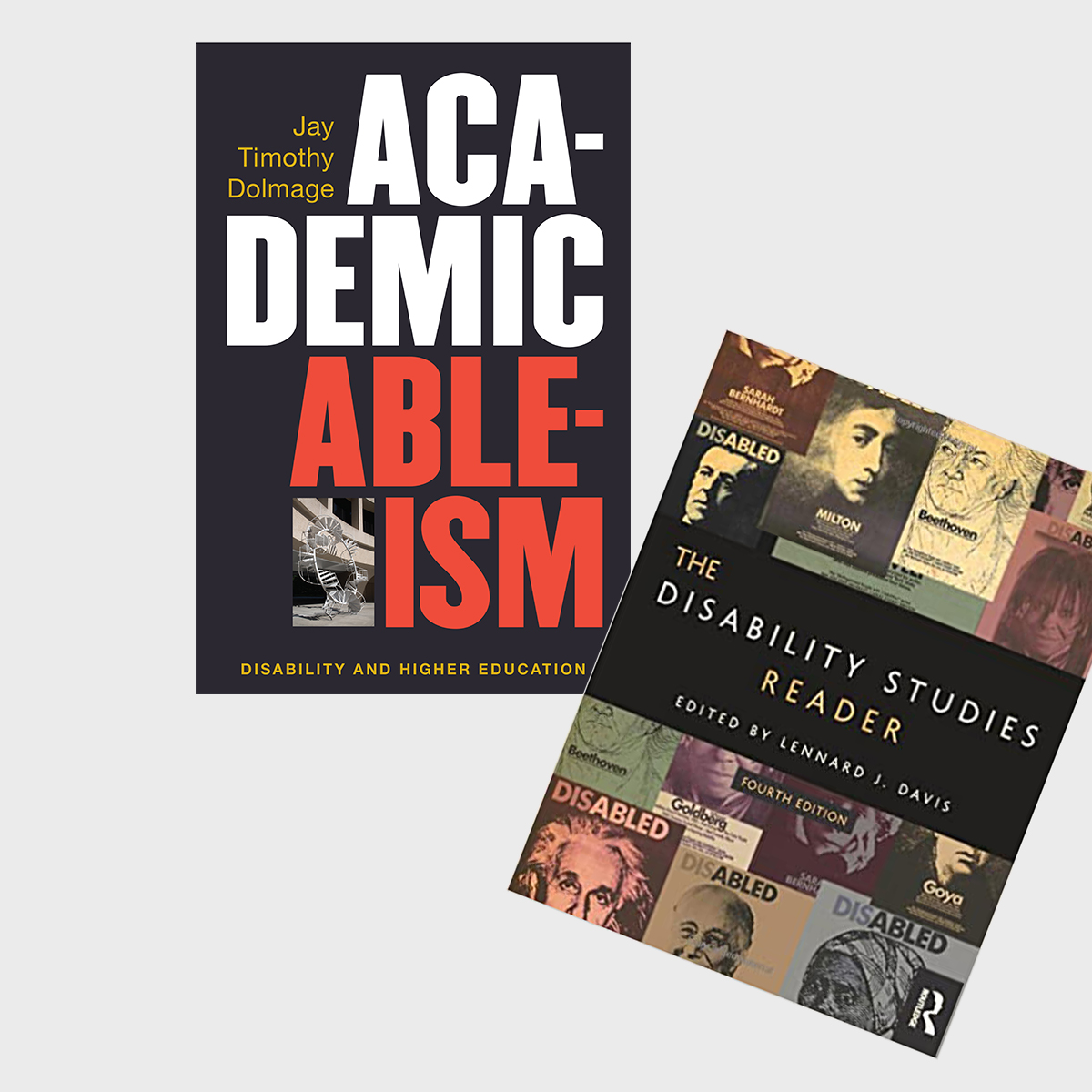
1. The Disability Studies Reader by Lennard J. David
Available for free: https://drive.google.com/file/d/1Os8gzcRsVYOmR2EXOZ6rbuXk0tkY_Oip/view
2. Academic Ableism by Jay Timothy Dolmage
Available for free: https://drive.google.com/file/d/1QD6eyeY_qnKuNEMLcjCMwgtipqBNj5RP/view
Both the Disability Reader and Academic Ableism are an important introduction into the world of disability theory and some of the histories surrounding the experiences of people with disabilities and it’s inherent intersectionality. Without opposing ableism you are truly not doing the work necessary to create actual inclusivity and a just society free of the segregation disabled people face in their daily lives. Disability theory is necessary in any conversation around racism, homophobia, transphobia, ageism, classism, and misogyny because ableism intersects with all of these modes of oppression as well. Disability doesn’t discriminate and if you don’t dismantle ableism in your activism it’s not activism.
Alison Veit is an artist and designer who lives and works in LA.
![]()
1. Sea and Fog by Etel Adnan
This is a book of poetry by Etal Adnan a Lebanese American painter and poet. I’m in love with how she writes. She seamlessly flows from deep emotional space to wisdom in a very personal very vivid and picturesque way, often with landscape, body feels and strange facts. I don’t think I’ve ever read better poetry.
2. Space and Place: The Perspective of Experience by Yi-Fu Tuan
I’m just starting this for the second time since college. He’s a geographer writing about how feelings affect our perception of space. It’s very deep and beautiful this time around.
3. The Miracle of Mindfulness by Thích Nhất Hạnh
This book by Vietnamese monk Thích Nhất Hạnh. He talks about being present and mindful. It is a super essential read right now and for all time. It’s helped me so much in my practice but also just living life in a connected and alive way
Cherisse Gray is an interdisciplinary artist who lives and works in Los Angeles.
![]()
1. The Intimacy of Four Continents by Lisa Lowe
A dense but incredibly worthwhile read where Lisa Lowe, a postcolonial theorist, goes deep into real British Archives to lay bare the co-dependent globalized relationship between the Americas, Africa, Asia, and Europe. This was a necessary and sobering read from my early 20's and served as my first introduction to the notion of settler colonialism. It serves as a reminder that any investigation of our historically asymmetrical distribution of violence necessitates both a wide and hyper specific investigation of actual Imperial legislation. This is a good introduction to tracing the roots of a globalized economy.2. The Passion According to G.H. by Clarice Lispector
You either love her or you don't, but I didn’t discover Clarice Lispector until about two years ago, and it was like drinking very cold wine on a hot & humid day. If you aren't familiar with her writing but are seeking out a hyper-indulgent and tender fiction written that reads like a diary– I would recommend this. Reading Lispector reminds me that I never need to compromise my own sense of taste, i.e. arrangement within space– even if it's too melodramatic for most.
3. Don’t Sleep, There are Snakes by Daniel L. Everett
While I won't defend this book as well-written per se, it is essentially the case study of a formerly Evangelical Christian missionary that moves to Brazil to translate the Bible into an indigenous language that no cultural outsider had ever been able to "crack". His experience led him to deconversion after coming to terms with the problems of his own ideological positioning via the observation of people group that had no creation myth, no savior, and whose grammar necessitated that every story have a known witness. This book was very important to me as I had just left Bible School about half a year prior and was still grappling with my choice of formally renounce my own religiosity. This book changed my opinion on several things but most importantly the necessity of an “origin story”, problems with Anthropology, and the notion of Universal Grammar.
Tierney Finster is a writer and host of the podcast Tierney Talks.
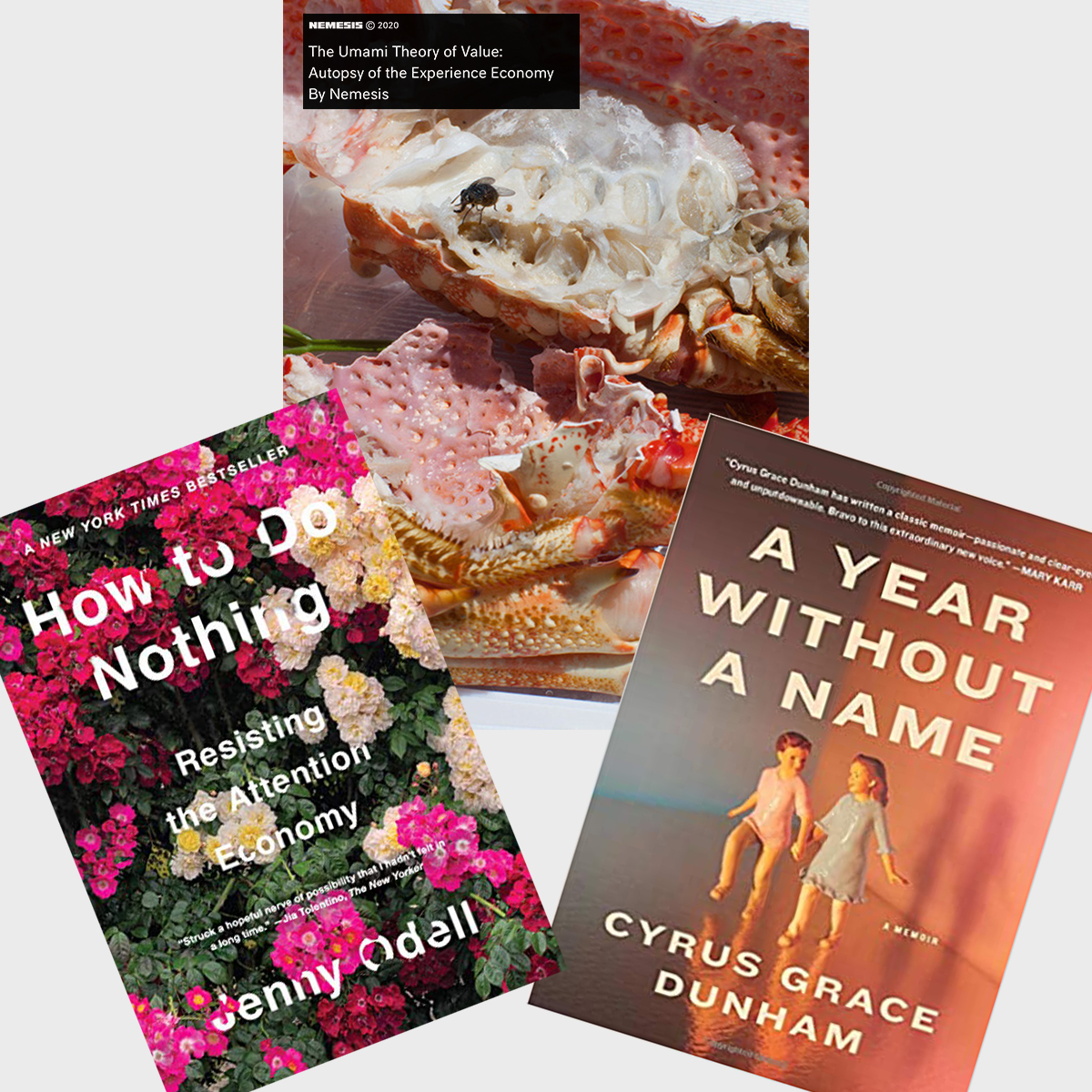
1. How To Do Nothing: Resisting The Attention Economy by Jenny Odell
An apropos title! Odell is a “close observer,” artist, writer and Stanford art professor who regularly assigns her students the challenging task of doing nothing. This book is full of analytical, environmentalist and anti-capitalist theory, but also feels like a love letter to California, bioregionalism and solitude. This book will make you take up bird watching (even if just through a window at home.) Good advice about the attention economy Odell told me during an interview last year, “If your overarching concern is to be informed in a meaningful way and to be able to contribute something thoughtful to a dialogue or to be able to actually organize or produce some kind of action, being totally disassembled by trying to stay on top of everything all the time might not help you with that.”
2. A Year Without A Name by Cyrus Grace Dunham
This memoir punctured me with its vulnerability and candor. The author gives us excellent, unflinching access to their idea of self, both the aspects still evolving and those that never seem to change. This is a visceral read that gutted me in its exploration of embodiment, desire, sex, gender, identity, friendship, family and filling your life up with truth and love.
3. The Umami Theory of Value: Autopsy of the Experience Economy by Nemesis
Emily Segal is a writer, cultural producer and trend forecaster (and one of my total genius idols). I love the way she interrogates systems of value and meaning and creates with language. This new report from Nemesis, her consultancy firm with Martti Kalliala, eulogizes the experience economy as we knew it (before “eating out” was solely a sex act done at home while social distancing). Read their umami-centric analysis of the last three years of cultural consumption and get to wondering about what comes next.
Available for free: https://nemesis.global/memos/umami
Jack Schneider is an artist, co-director of Prairie, and curatorial assistant at the MCA.
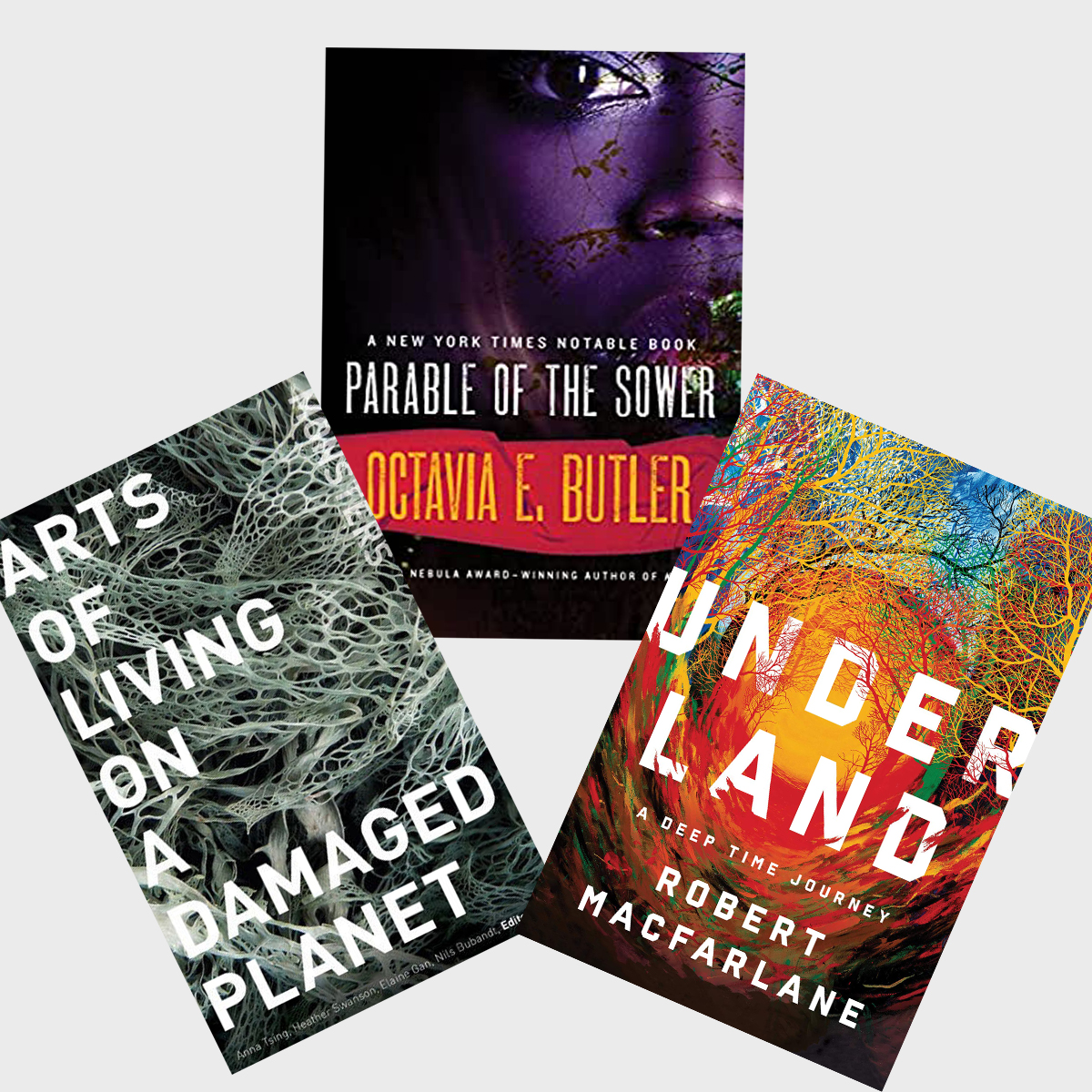
1. Parable of the Sower by Octavia Butler
This is the book I recommend to anyone who says they don't like Sci-Fi. It's a character-driven novel that is prescient to our times in many ways. Notably there’s a xenophobic conservative politician character whose campaign slogan is “Make America Great Again” (the book was written in 1993).
2. Arts of Living on A Damaged Planet, Editors: Anna Tsing, Heather Swanson, Elaine Gan, Nils Bubandt
An anthology of fascinating essays on the haunted landscapes of our planet. In this book haunting is not a supernatural phenomena, it's the manner in which past ways of life—both human and nonhuman—create the conditions for living today.
3. Underland by Robert Macfarlane
Macfarlane evokes place through language more vividly than anyone I've ever read. In this book he recounts his travels to various “underlands”—from subterranean laboratories, to ancient burial chambers, to the fungal networks that connect entire forests.
Lori-May Orillo is a Filipino-American poet and artist working from Chicago, Illinois and currently bunkered out in Columbus, Ohio.
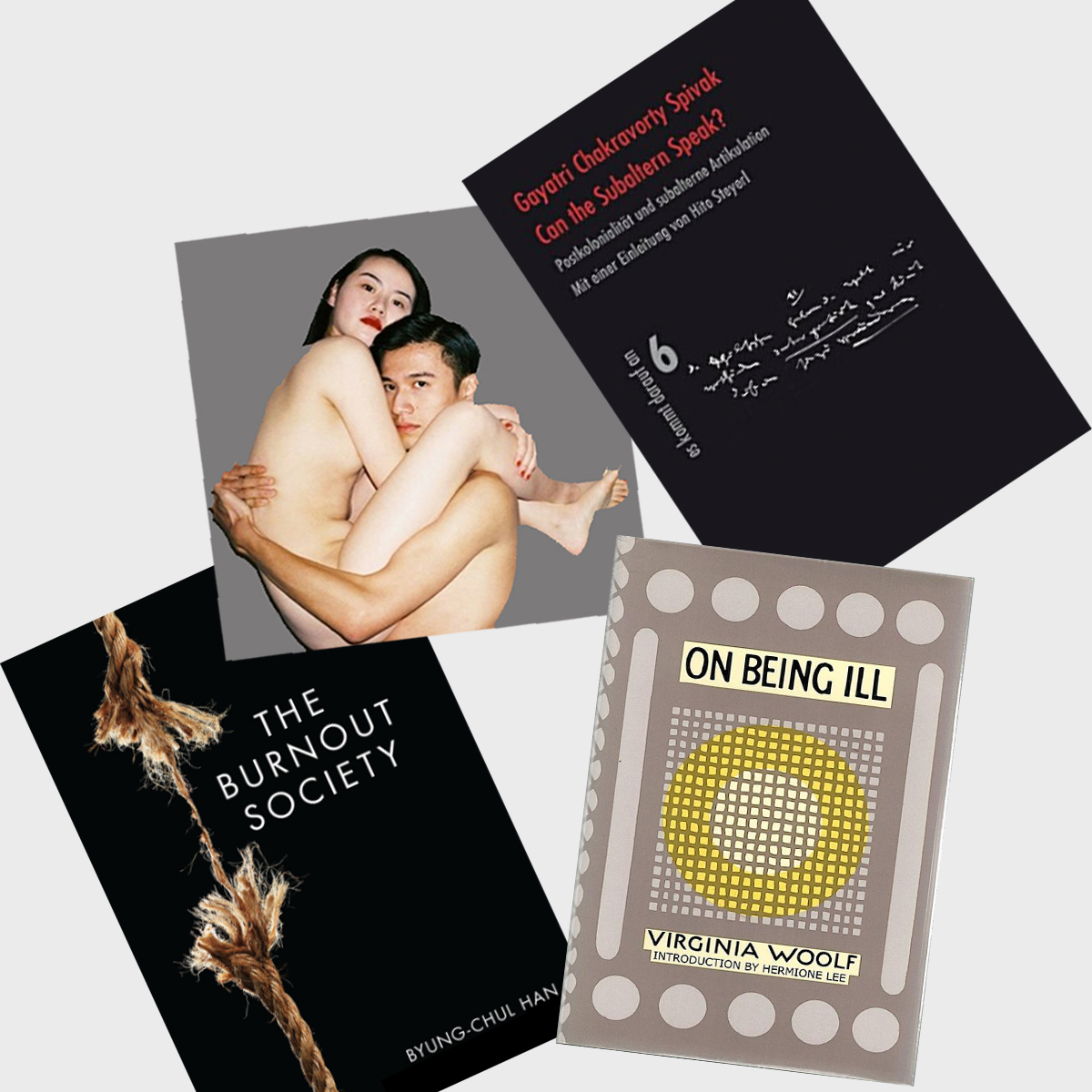
1. The Burnout Society by Byung-Chul Han
What with the unknown virulence of this virus, and reports, some hyperbolic some true sweeping us away in our solitudes... it has been soothing for me at my distance, to secure a frame of mind. I thought of Byung-Chul Han's The Burnout Society. To manage fear we hoarded toilet paper. What cultural circumstances make it suitable for an "immunological" problem to be met by an obsessive compulsive "neuronal response"? We hide in our homes asymptomatic and idle yet we are fatally engaged if we spread a virus and/or our anxiety. I am using the tools of Han's vernacular to navigate cabin fever, "burnout syndrome," and what it means to be off work with no end in sight.
2. Ren Hang’s poetry, interviews, journal entries, anything
to be found of their short-lived career
I'd like to believe I didn't stop what I was thinking about before the crisis. After updates, letters, petitions for rent freeze, unemployment, mutual aid, etc. it has been a slow burn, which in its spare offered me to idling. I was reclined sideways in a pool of shallow water, curled around myself as the cochlea of an ear. It reminded me of some posture in the work of late Chinese photographer Ren Hang. I never relate this way to the subjects of photography, I never make it to that world. I owe my obsession to work capable of rescuing the naked asian body from centuries of publicly acceptable attrition and diminutization to a fantasy of our own terms, with dignity and grace. I scour the internet for these pearls. They're just snippets here and there online.
3. Can the Subaltern Speak? by Gayatri Chakravorty Spivak
In my own time, place, and terms, my identity is boundless. Numinous shapeshifting, learning, improving, rising to that cloud of idleness hovering in the corners of a ceiling. If I never felt so much care or responsibility for others -- including my little brown mousey self whose presence is often lost to quotidian diminutization -- I might never consider dissolving to general representations. Spivak teaches the strategic use of this to protect agency. For mice like me, such considerations must be accessed constantly, otherwise we are squelched in a system with few narrative sanctions if at all.
Available for free: http://abahlali.org/files/Can_the_subaltern_speak.pdf
4. On Being Ill by Virginia Woolf
"CONSIDERING how common illness is, how tremendous the spiritual change that it brings, how astonishing, when the lights of health go down, the undiscovered countries that are then disclosed, what wastes and deserts of the soul a slight attack of influenza brings to light, what precipices and lawns sprinkled with bright flowers a little rise of temperature reveals, what ancient and obdurate oaks are uprooted in us in the act of sickness, how we go down into the pit of death and feel the waters of annihilation close above our heads and wake thinking to find ourselves in the presence of the angels and the harpers when we have a tooth out and come to the surface in the dentist's a rm chair and confuse his 'Rinse the mouth—rinse the mouth ' with the greeting of the Deity stooping fro m the floor of Heaven to welcome us—" -- page 1/14, the sentence gone unfinished.
I pick this essay up about several times a year from an old beautiful green fabric edition, insides overgrown with my annotations. If the poet makes a religion of nature, I elect this a very special map. I pick it up obdurate nights, sad little mouse me loping clutching dustpan kernal, with the sort of loneliness "glad for a kick." If it isn't clear from her opening, On Being Ill is a sort of travelogue of mind for those who go in fully, and even love the music of boredom and occasional hallucination. It seems Virginia in her mind is a fish, for "with the hook of life still in us still we must wriggle." There's this painful thing that pulls us on. Here is someone who comes with us, to be alone together, to stare at the sky recumbent in some park somewhere, this the book overhead.
Available for free: https://thenewcriterion1926.files.wordpress.com/2014/12/woolf-on-being-ill.pdf
Cyrus Dunham is the author of A Year Without a Name and a member of the California Coalition for Women Prisoners.
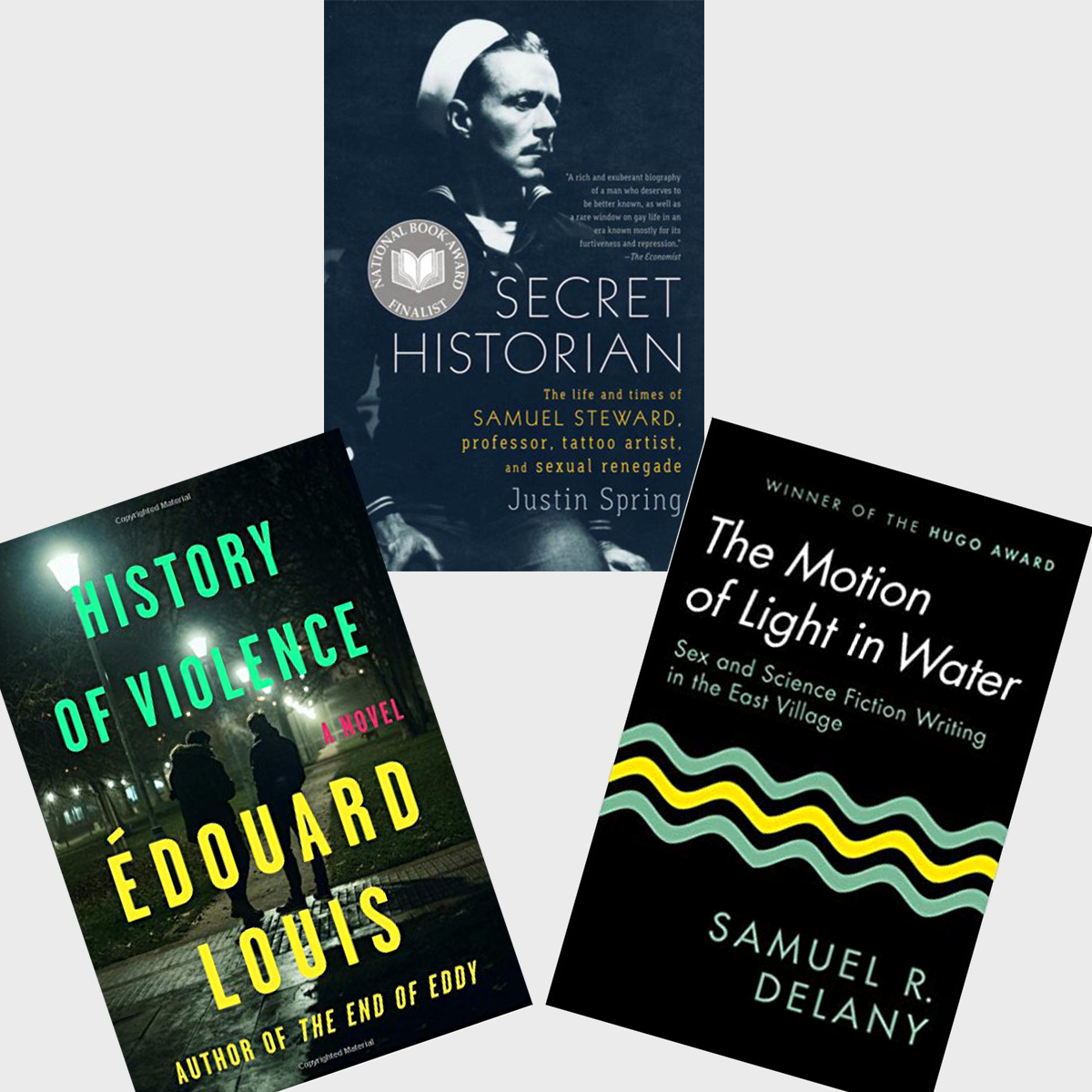
1. Secret Historian: The Life and Times of Samuel Steward, Professor, Tattoo Artist, and Sexual Renegade by Justin Spring
I just started rereading one of my favorite biographies ever, Secret Historian: The Life and Times of Samuel Steward, Professor, Tattoo Artist, and Sexual Renegade. As beautiful and strange as I remember. Steward lived many lives under many names, all in the pursuit of perverse and unusual pleasure.
2. The Motion Of Light In Water: Sex And Science Fiction Writing In The East Village by Samuel R. Delany
Another book I felt compelled to reread these past weeks, likely because Delaney's prose helps me tune into the possibility that runs through the gutters. Also, I felt homesick for New York, and this book is about a life spent there.
3. History of Violence: A Novel by Édouard Louis
I was really moved by Louis' ability to write about sexual violence without reverting to reductive frameworks of good and evil & victim and perpetrator, as well as his honesty about how lust and pleasure figured into the events leading up to an attack.


